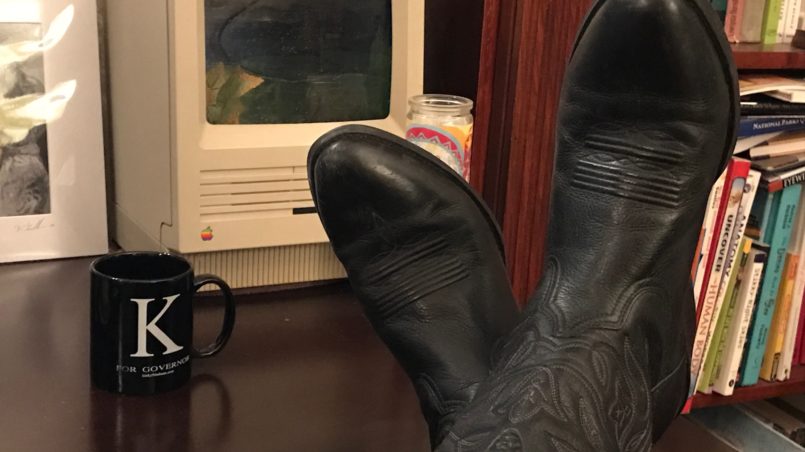By Maud Kersnowski Sachs
Lately, I’ve been dressing like a slob. I’m pretty much living in yoga pants and over-sized flannel shirts. But it was the shoes that made me realize there was problem: a pair of beyond-broken-in, clunky, faded black, all-weather slip-ons. I’ve been telling myself that it’s February, my annual month of SAD and brownies. And then there’s the fact that our country is going to hell. What’s the point of wearing cute shoes if, in the next news cycle, we could be going to war with China or Mexico or Sweden? But being a slob isn’t actually making me feel any better. In fact, it may well be making me feel worse.
Dressing the part has always worked for me—even if it was just my feet. When I was a freelance journalist in L.A., I worked out of my house. To be precise, I worked out of my laundry room. I kept a pair of dark green, sensible heels under my desk. They weren’t shoes I would normally wear. I think I bought them for a wedding or a funeral. But there was something about them that was very grown up and professional. They made me feel like Lois Lane. Even if I was covered with mud from playing with the dogs when the phone rang, if I slipped on those heels I could handle whoever was on the other end. In those shoes, I interviewed the mayor of Los Angeles, Lakers players, movie stars, senators and technology moguls. Even when a slobber-covered tennis ball was dropped in my lap during an interview with Microsoft co-founder Paul Allen, I still felt like a professional journalist because my feet were settled into those green pumps.
It turns out, there is more to all this than my love of shoes, which is deep and genuine. There is some actual science behind “dressing the part.” Two different studies have shown that what you wear can improve how well you perform attention-related tasks. In one study, half the subjects were given white lab coats to wear over their street clothes, while the other participants received no additional accessories. The group wearing lab coats scored almost 50% higher on standard tests that measure focus and attention. It turns out that keeping those shoes under my desk, even has a scientific name—Enclothed Cognition.
I fell into covering the tech industry because I was writing about entertainment at a time when the two businesses started merging. Tech wasn’t a world I knew much about. I’d start every interview with: “Explain this to me like I was your grandmother.” Part of my job involved going to meetings and conferences. I’d show up wearing a pair of black, thick soled, chunky, lace-up heels that I had bought in a little shop in Noe Valley. I call them my San Francisco shoes. I always felt like those shoes saved me in the tech world. My outfits changed, but the shoes remained the same until the tech industry went through one of its periodic implosions and there wasn’t much left to write about.
My thick-soled, San Francisco shoes were doing even more than improving my focus and making me taller, both of which in the male-dominated tech industry I appreciated. They were telling people who I was. Shoes more than any other piece of clothing telegraph our identities. A study at the University of Kansas and Wellesley College found that 90% of time people can determine not only a person’s gender and age by their shoes, but also their income, political leanings, and personality traits.
According to the study, people who wear brightly colored sneakers are emotionally stable. Extroverts slip on comfortable, slightly worn shoes. High-end shoe wearers are more conservative. And boot people tend to be aggressive—although I prefer the word assertive.


